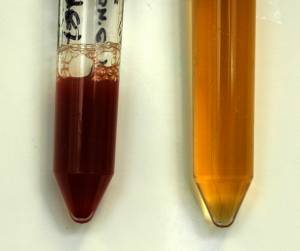
Aim to drink enough water to make your urine clear or light yellow. Getting enough water every day can prevent stones from forming and stop them from coming back. Sometimes your doctor might give you medications or do shockwave therapies to break up stones, but extra water can dissolve stones and help you pass them. One of the main treatments for kidney or bladder stones that cause blood in urine is to drink water. If your doctor finds cancer, you might need surgery, radiation, or chemotherapy. Kidney diseases can be treated with diuretics, steroids, or other medications. You’ll need antibiotics for kidney, bladder, or urinary tract infections. The treatment for hematuria depends on the cause. What are the treatments for blood in urine?

Medicines like phenazopyridine or cascara that dye your urine.Sometimes red urine is not caused by blood in your urinary tract but by other things, including: In many cases, the cause for hematuria is unknown. Some people who have a bleeding condition and take aspirin or other blood thinner medications might see blood in the urine. Other conditions that can cause bleeding in your urinary tract include lupus, sickle cell disease, an enlarged prostate, and some medications like penicillin and cyclophosphamide. Specific urinary tract diseases also commonly cause hematuria, including: A challenging workout or long-distance running can jolt your bladder and cause bleeding. One harmless but rare cause is strenuous exercise. Lots of conditions can lead to blood in your urine. The damage could be in your kidneys, ureter tubes, or bladder. Hematuria means that your urinary tract is leaking blood somewhere. If you see blood, you should first see a doctor to rule out any problems. Common advice for urine problems or blood in urine is to drink water, but that’s not always helpful. In most cases, it will go away on its own. This type is often found during routine testing.īlood in your urine doesn’t always mean you have a severe problem. Sometimes you can have tiny amounts of blood that you can’t see, called microscopic hematuria.

Hematuria might turn your urine pink, red, or dark brown. It’s not a disease but a symptom of an underlying condition or a side effect of some activities.īlood you can see in your urine is called gross or visible hematuria.

Drink water if you have blood in your urine, but see your doctor as well.īlood in your urine is called hematuria.


 0 kommentar(er)
0 kommentar(er)
